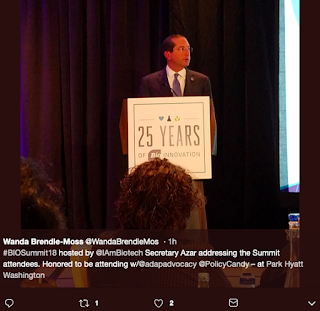The ADAP Advocacy Association has long prided itself on building advocacy partnerships, and thus it is fitting that our organization's leadership — including board members Wanda Brendle-Moss and Jen Laws, as well as myself — was invited to attend the Biotechnology Innovation Organization's (BIO) 2018 Patient & Health Advocacy Summit in Washington, DC. What makes the annual event useful is it assembles the advocacy community, industry partners, regulators, academia, students, and of course, patients.
Susan Stein, MPH, who serves as CEO of the E4 Health Group, shared a simple, yet powerful characterization: "Partnerships between patient advocacy organizations and industry are more important than ever."
 |
| Photo Source: FierceAdvocate |
The BIO 2018 Patient & Health Advocacy Summit brought together over 200 key stakeholders for two days of programming to discuss current policy issues, share best practices, and exchange ideas. Nearly two-thirds of the attendees represented the patient advocacy community. The BIO Summit also provided an invaluable opportunity to advance partnership among stakeholders in the healthcare ecosystem. Whereas the ADAP Advocacy Association's participation represented HIV/AIDS, there were many other disease groups in attendance, such as Psoriasis, Arthritis, Muscular Dystrophy, Metachromatic Leukodystrophy, and many more.
The BIO Summit immediately addressed the 800 pound gorilla in the healthcare ecosystem with an important pre-summit workshop on best practices for engaging with industry. As the patient perspective plays a more central role in the drug development process, it is recognized that clearer conflict-of-interest policies and best practices would better serve all stakeholders. The patient voice has moved beyond simply participating in clinical trials, and as a result industry and regulators are engaging patients earlier in the process. The 21st Century Cures Act includes a commitment to patient-focused drug development ("PFDD"). It amends the Federal Food, Drug, and Cosmetic Act to require the Food & Drug Administration to establish processes under which patient experience data may be considered in the risk-benefit assessment of a new drug.
The timing of the BIO Summit couldn't have been planned any better with the Trump Administration's latest announcement under its blueprint for prescription drug reform. The latest proposal would set up an international pricing index in an effort to drive down prescription drug costs under Medicare Part B, which in turn, could also drive down patient out-of-pocket costs. The U.S. Department of Health & Human Services ("HHS") Secretary Alex Azar discussed the "pro patient access proposal" at the BIO Summit, only hours after it was announced.
HHS's decision to announce an Advance Notice of Proposed Rulemaking ("ANPRM") translates into the patient advocacy community having ample time to weigh-in on it. It could very well be the case that the public comment period represents one of the times where the patient advocacy community and industry view things differently, but that is a good thing.
For a policy brief on the ANPRM, please visit: https://www.hhs.gov/about/leadership/secretary/priorities/drug-prices/ipi-policy-brief/index.html.
For a fact sheet on the ANRPM, please visit: https://www.cms.gov/newsroom/fact-sheets/anprm-international-pricing-index-model-medicare-part-b-drugs.
Comments on the ANPRM will be accepted until December 31, 2018 and may be submitted electronically through the CMS e-Regulation website at: https://www.cms.gov/Regulations-and-Guidance/Regulations-and-Policies/eRulemaking/index.html?redirect=/eRulemaking.
The ANPRM can be downloaded at: https://www.cms.gov/sites/drupal/files/2018-10/10-25-2018%20CMS-5528-ANPRM.PDF.


1 comment:
I think it is time to have more of a community input the pros and cons of their personal experiences with drug costs copays meds that arent being covered med assistance programs that are that are out there when there physican prescribes a medication thats not covered on there formulary ngreat article
Post a Comment